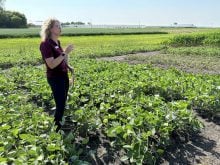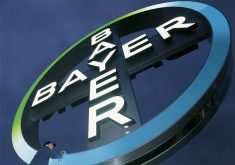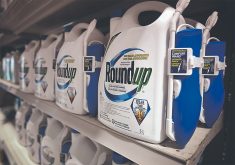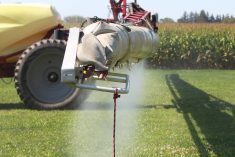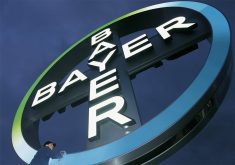FRANKFURT, Germany (Reuters) — Bayer has posted a 16.5 percent drop in quarterly adjusted earnings, becoming the latest agricultural chemical supplier to be hit by weak demand due to lower grains prices.
The development added to the chief executive officer’s challenges in his second year in the job.
Bayer boss Bill Anderson has launched a push to speed up decision making and slash corporate bureaucracy to turn around the embattled industrial group, and job cuts gathered pace in the second quarter, according to the company’s statement.
Read Also

Saskatchewan puts crown land auction on hold
Auctions of Saskatchewan crown lease land are once again on hold.
Bayer’s April-to-June earnings before interest, taxes, depreciation and amortisation (EBITDA), adjusted for one-off items, fell to US$2.3 billion, also dragged lower by negative foreign exchange effects, in line with an average analyst estimate posted on the company’s website.
Bayer, which had close to 100,000 staff at the end of 2023, said it had cut the equivalent of 3,200 full-time jobs during the first six months of this year, marking an acceleration after cutting 1,500 jobs during the first quarter.
Anderson, who is slashing hierarchy levels to give product developers and sales people more power, has ruled out any staff reduction targets beyond saying cuts would be significant.
The voluntary redundancies, affecting managers primarily, have so far been consistent with a target to cut $2.18 billion in annual costs from 2026, Anderson said.
“This is exactly what we envisioned,” he told a media call.
The tough farming market has been felt by rivals including Corteva of the United States, which recently cut full-year forecasts, hurt by lower prices.
A decline in agricultural commodity prices has forced many farmers to rein in their spending on crop chemicals.
BASF, another major competitor, has said herbicide and fungicide sale volumes declined during the April-to-June quarter, normally a key earnings-generating season for the industry.
Bayer confirmed its previous full-year earnings guidance, saying agriculture product margins would recover, excluding earnings from glyphosate, which has been subject to costly legal claims alleging that it causes cancer.
Deutsche Bank analysts said in a research note that better-than-expected pharmaceutical sales were broadly offset by a disappointing agriculture business.
Anderson said in March he would hold off for up to three years on previous preparations to break apart the German maker of pharmaceuticals, crop protection products and consumer health remedies.
His focus is instead on changing Bayer’s management structure as well as on cutting debt and dealing with a massive wave of U.S. product liability lawsuits, even though the U.S. environmental regulator has declared glyphosate safe to use.
Anderson, who became CEO in June 2023, has had a tumultuous start in the job marked by falling share prices and efforts to end the glyphosate litigation.
The company also suffered a major setback in drug development late last year.
The CEO, however, clearly won a confidence vote at his first annual general meeting for Bayer in April. Earlier in the year, top-five shareholder Harris Associates came out in strong support for Anderson’s course.




